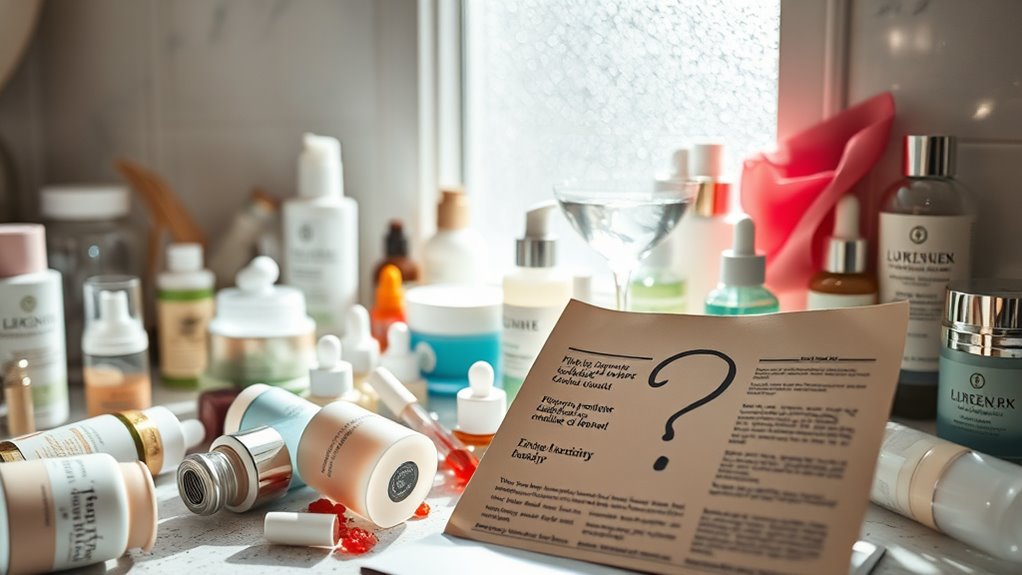Why Your Skincare Isn’t Working-And What to Do Instead
Your skincare isn’t working because you might be overusing products, ignoring your specific skin type, or skipping sunscreen. Overuse can irritate your skin, while neglecting to tailor your routine to your unique needs hinders effectiveness. Consistency in application is critical, and sun protection is essential for preventing damage. Understanding ingredient labels is also key to making informed choices. If you want to discover more about optimizing your skincare routine, continue exploring what you might be missing.
Overusing Products: The Less Is More Approach
Using too many products can sabotage your skincare routine more than you might realize.
Overusing ingredients, especially actives, can lead to irritation, compromising your skin barrier. This is one of the most common skincare mistakes you can make.
Instead of layering multiple treatments, focus on a few well-formulated products.
Simplifying your routine often yields better results, allowing your skin to thrive. One key aspect of effective skincare is understanding the skin barrier, which plays a crucial role in maintaining healthy skin.
Ignoring Skin Type: Tailoring Your Routine
Overloading your skincare routine with products is often compounded by ignoring your skin type.
Identifying your skin’s unique needs is crucial for efficacy. Consider these key factors:
- Oiliness or dryness levels
- Sensitivity and irritation potential
- Age-related concerns
- Specific conditions (e.g., acne, rosacea)
- Ingredient compatibility
Tailor your routine accordingly to enhance results and achieve healthier skin.
Additionally, discovering your skin type through a simple at-home test can provide valuable insights into how to customize your skincare regimen effectively.
Personalization isn’t just beneficial; it’s essential.
Inconsistent Application: Building a Habit
Although you might invest in high-quality products, inconsistent application can undermine your skincare efforts.
Research shows that consistent use enhances product efficacy and accelerates skin regeneration. To build a habit, establish a daily routine and set reminders. Consider pairing your skincare with existing habits, like brushing your teeth, to ensure you apply products consistently, maximizing their benefits and improving your skin’s overall health. By prioritizing the power of consistency, you can achieve long-lasting and visible results.
Skipping Sun Protection: Essential Daily Care
Daily sun protection is a critical component of any effective skincare regimen, yet many skip this essential step.
Not applying sunscreen can lead to premature aging and skin damage. To ensure you’re properly protected, consider these key points:
- Use a broad-spectrum SPF 30 or higher
- Apply sunscreen daily, even on cloudy days
- Reapply every two hours
- Don’t forget areas like ears and neck
- Choose water-resistant options for outdoor activities
Additionally, many people make mistakes such as insufficient application of sunscreen, which can significantly reduce its effectiveness.
Neglecting Ingredients: Understanding Label Claims
How can you make informed choices about your skincare products if you don’t understand the ingredients listed on their labels?
Familiarize yourself with key terms and active components like retinol, hyaluronic acid, and antioxidants.
Research their benefits and potential side effects to ensure they meet your specific skin needs. Misinterpreting claims may lead to ineffective products and hinder your skincare goals. Incorporating ingredients like active components can significantly enhance your routine.
Make informed decisions.
Patience Is Key: Allowing Time for Results
Skin cell turnover averages 28 days, meaning many products require consistent use for full effects. Patience is vital to allow active ingredients to work effectively.
- Stay consistent
- Avoid frequent product changes
- Track your progress
- Manage expectations
- Consult a dermatologist
Moreover, skin changes can often reflect underlying health conditions, underscoring the importance of monitoring your skin’s response to new products.

